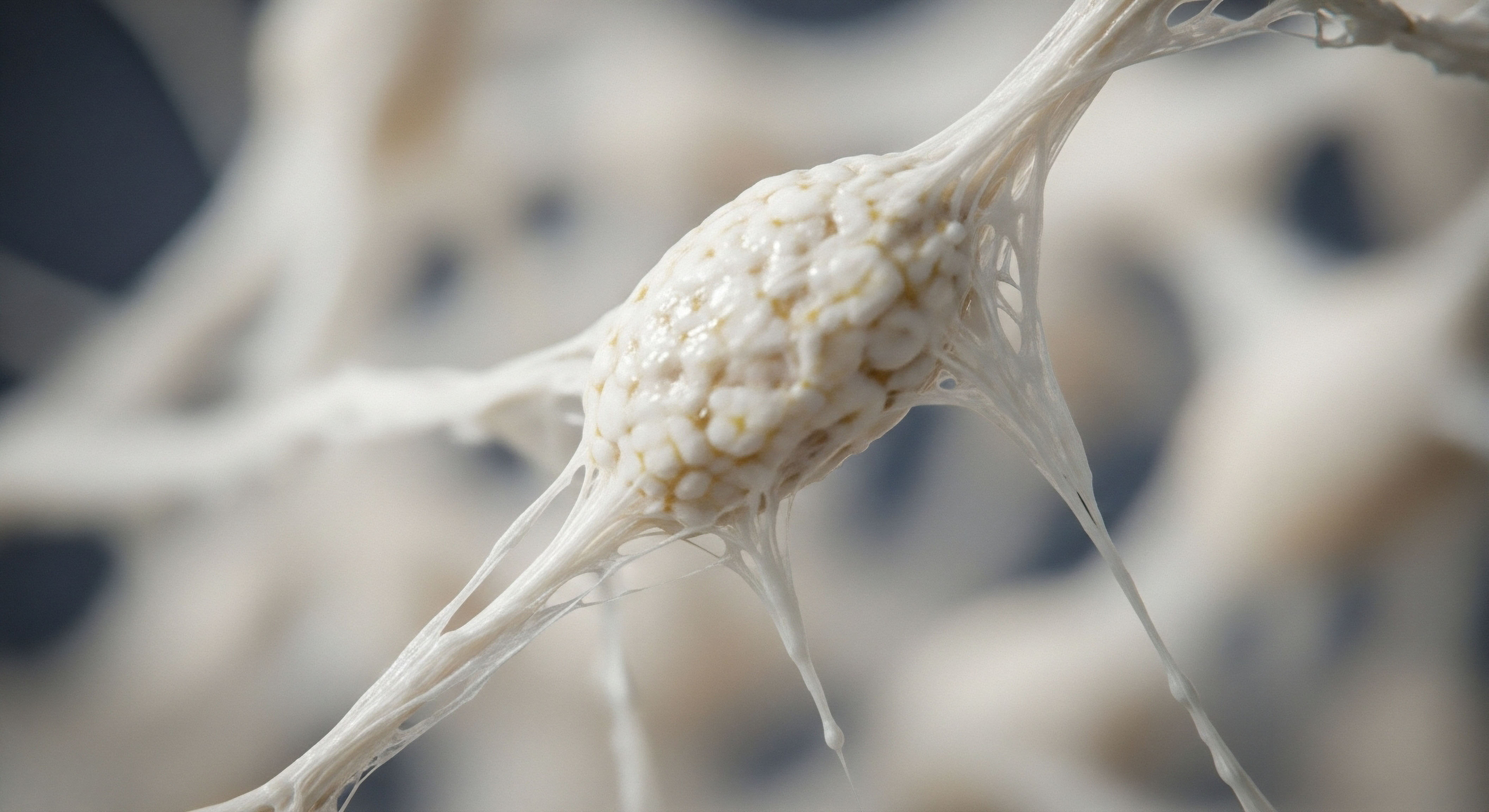

The Erosion of Innate Power
The human form, an intricate symphony of biological systems, often confronts a predictable decline as years accumulate. This decline is not a mystical process; it represents a quantifiable shift in fundamental physiological parameters. The vitality we experience in our earlier decades reflects optimal function within endocrine networks, cellular regeneration cycles, and metabolic efficiency. With the passage of time, these foundational systems exhibit measurable shifts.
Consider the endocrine system, a master regulator of performance. Testosterone levels in men begin a gradual descent from their peak, a phenomenon directly impacting muscle mass, bone density, cognitive sharpness, and psychological drive. Women experience similar profound hormonal recalibrations, affecting mood, energy, and physical resilience. These are tangible, well-documented biological alterations, not mere anecdotal observations. The body’s internal chronometer dictates these changes, influencing everything from the strength of a handshake to the clarity of thought.
Beyond hormonal shifts, cellular health undergoes a profound transformation. Cells accumulate damage, enter states of senescence, and lose their capacity for efficient replication and repair. Mitochondria, the cellular powerhouses, experience a reduction in their output and integrity. This diminished cellular energy production translates directly into systemic fatigue, slower recovery, and a reduced capacity for physical and mental exertion. The collective impact manifests as a gradual but persistent erosion of innate power, challenging our inherent drive for peak performance.
“Studies consistently reveal a 1-2% annual decline in total testosterone levels in men over 30, directly correlating with reductions in lean body mass and bone mineral density.”
Understanding these biological underpinnings provides the blueprint for intervention. The challenge involves identifying the precise mechanisms of decline and applying targeted, evidence-based strategies to restore equilibrium. This perspective reframes aging, transforming it from an inevitable surrender to a dynamic, optimizable process.
We perceive the body as a high-performance system, one capable of receiving critical upgrades and precise tuning to defy conventional expectations of decline. The goal involves re-establishing the biological conditions of a younger, more vigorous state, ensuring a sustained output of energy and cognitive function.

Hormonal Orchestration Disrupted
The Hypothalamic-Pituitary-Gonadal (HPG) axis, a complex feedback loop, governs the production of sex hormones. As individuals age, this axis frequently loses its precise calibration. The hypothalamus and pituitary glands become less sensitive to circulating hormone levels, and the gonads themselves may produce hormones with reduced efficiency.
This leads to a cascade of effects ∞ reduced androgen and estrogen levels, altered growth hormone pulsatility, and shifts in thyroid function. Each of these components contributes to the overall metabolic and physiological landscape.
These hormonal alterations directly impact the body’s capacity for tissue repair and regeneration. Muscle protein synthesis rates decrease, leading to sarcopenia. Bone turnover becomes less efficient, increasing fragility. Even cognitive functions, including memory recall and processing speed, correlate with optimal hormonal balance. A proactive approach addresses these systemic imbalances at their root, providing the raw materials and signaling necessary for the body to maintain its structural and functional integrity.

Cellular Resilience under Strain
Beyond hormonal factors, cellular aging plays a significant role in the overall decline. Telomere shortening, DNA damage, and the accumulation of senescent cells contribute to a state of chronic, low-grade inflammation, often termed “inflammaging.” These senescent cells secrete pro-inflammatory cytokines, creating a hostile microenvironment that impairs the function of surrounding healthy cells. This cellular burden compromises tissue health across organ systems, from the vascular endothelium to neural networks.
Mitochondrial health represents another critical component. These organelles generate adenosine triphosphate (ATP), the primary energy currency of the cell. Age-related mitochondrial dysfunction reduces energy availability, impairing cellular processes that require high metabolic demand, such as muscle contraction and neuronal firing. Maintaining mitochondrial biogenesis and function stands as a central tenet of longevity science, offering a pathway to sustain energetic output and cellular resilience.


Precision Protocols for Peak Output
Reversing the biological tide requires a strategic, evidence-based approach, leveraging the insights of modern performance science. This involves targeted interventions designed to optimize endocrine function, enhance cellular health, and calibrate metabolic pathways. We move beyond generic wellness advice, embracing protocols grounded in rigorous clinical data.
Hormone optimization stands as a cornerstone of this strategy. For men, Testosterone Replacement Therapy (TRT), when administered judiciously and monitored closely, restores physiological levels of testosterone. This intervention yields significant improvements in body composition, including increased lean muscle mass and reduced visceral fat. Patients report enhanced energy, mood stability, and cognitive function. The precision involves understanding individual biomarker profiles and tailoring dosages to achieve optimal, rather than supraphysiological, levels.
Peptide science offers another powerful avenue for biological enhancement. Peptides, short chains of amino acids, act as signaling molecules, directing cellular processes with remarkable specificity. Growth Hormone-Releasing Peptides (GHRPs) and Growth Hormone-Releasing Hormones (GHRHs), such as Ipamorelin and CJC-1295, stimulate the pulsatile release of endogenous growth hormone. This promotes tissue repair, supports lean body mass, and improves sleep quality. Other peptides, like BPC-157, demonstrate promise in accelerating recovery from injury and supporting gastrointestinal health.
“A meta-analysis of TRT studies showed an average increase of 2-5 kg in lean body mass and a 1-3% reduction in body fat over 6-12 months in hypogonadal men.”
Metabolic health represents a fundamental pillar of sustained vitality. This involves optimizing glucose regulation, insulin sensitivity, and lipid profiles. Strategic nutritional planning, emphasizing whole, nutrient-dense foods, alongside timed eating patterns, provides the foundation. Targeted supplementation with compounds supporting mitochondrial function, such as CoQ10 or PQQ, further enhances cellular energy production. Exercise, particularly resistance training and high-intensity interval training, remains a potent modulator of metabolic health and hormonal response.

Endocrine Recalibration
Optimizing the endocrine system demands a nuanced approach. Testosterone therapy, for example, necessitates a comprehensive understanding of the HPG axis. We administer exogenous testosterone to restore levels, while concurrently monitoring estradiol, dihydrotestosterone, and hematocrit. The goal is a balanced endocrine milieu, where the benefits of restored androgenicity manifest without adverse effects.
For women, bioidentical hormone replacement therapy (BHRT) addresses declining estrogen, progesterone, and DHEA levels, mitigating symptoms and supporting bone, cardiovascular, and cognitive health. This involves careful titration and continuous assessment of symptom resolution and biomarker trends.
The choice of hormone delivery method, be it injections, transdermal creams, or pellets, also influences the physiological response. Each method possesses unique pharmacokinetic properties impacting stability of hormone levels. We select the optimal delivery system based on individual physiology and lifestyle considerations, ensuring a consistent and predictable biological effect.

Signaling Cellular Intelligence
Peptide protocols represent a sophisticated layer of biological optimization.
- GHRPs/GHRHs (e.g. Ipamorelin, CJC-1295) ∞ These compounds work synergistically to enhance the body’s natural production of growth hormone. This supports cellular repair, collagen synthesis, and fat metabolism, leading to improved body composition and recovery.
- BPC-157 ∞ A potent healing peptide, BPC-157 accelerates the repair of muscle, tendon, and ligament injuries. It also supports gut integrity, a critical aspect of systemic health and nutrient absorption.
- Thymosin Beta 4 (TB-500) ∞ This peptide aids in tissue regeneration and repair, promoting angiogenesis and reducing inflammation. It contributes to faster recovery and enhanced tissue resilience.
The precise application of these peptides involves understanding their half-lives, optimal dosing frequencies, and routes of administration. This approach delivers targeted biological instructions, allowing the body’s inherent healing and regenerative capacities to operate at an elevated level.

Metabolic Mastery and Physical Conditioning
A high-performance physiology requires a meticulously calibrated metabolic engine. This involves:
- Nutritional Precision ∞ Tailoring macronutrient intake to individual metabolic needs, prioritizing protein for muscle synthesis, healthy fats for hormonal health, and complex carbohydrates for sustained energy.
- Glucose Homeostasis ∞ Strategies like intermittent fasting and targeted carbohydrate timing improve insulin sensitivity, reducing metabolic stress and supporting mitochondrial function.
- Resistance Training ∞ Building and maintaining muscle mass stands as a powerful anti-aging intervention. Muscle acts as an endocrine organ, influencing systemic metabolism and hormonal signaling. Progressive overload and varied training modalities optimize this effect.
- Strategic Conditioning ∞ Integrating cardiovascular work, including Zone 2 training and occasional high-intensity bursts, enhances mitochondrial density and cardiovascular health, ensuring robust systemic oxygen delivery.
These interwoven strategies create a metabolic environment conducive to peak output, providing the energy and resilience necessary for an uncompromised life.


Claiming Your Enduring Apex
The journey to uncompromised strength represents a commitment to ongoing optimization, a continuous calibration of biological systems. This is not a finite program with a definitive end date; it signifies a sustained state of mastery over one’s own physiology. The timing of interventions, the monitoring of progress, and the adaptive nature of the protocols all contribute to securing an enduring apex of vitality.
Proactive intervention often yields the most significant returns. Initiating optimization strategies before profound declines become entrenched allows for a more effective restoration of function. Regular biomarker analysis serves as the compass, guiding these interventions. Comprehensive blood panels, including hormone profiles, metabolic markers, inflammatory indicators, and genetic predispositions, provide actionable data. This data permits precise adjustments to protocols, ensuring alignment with individual physiological responses.
The expected results from these protocols unfold over varying timelines. Hormonal recalibration can bring noticeable shifts in energy and mood within weeks, with more significant changes in body composition and strength manifesting over several months. Peptide therapies often demonstrate their effects on recovery and tissue repair within a few weeks.
Sustained adherence to nutritional and exercise strategies solidifies these gains, creating a compounding effect over time. The true power lies in the long-term vision, recognizing that consistent, data-driven effort builds an optimized physiology capable of performing at its highest level for decades.

The Chronology of Optimization
Understanding the timeline for physiological adaptation stands paramount. Initial phases focus on establishing baseline biomarker data and implementing foundational protocols. This period often lasts 8-12 weeks, during which the body begins its initial recalibration. Subsequent phases involve fine-tuning, where dosages adjust based on follow-up labs and subjective feedback. The objective involves reaching a stable, optimized state, characterized by consistent energy, robust physical performance, and mental acuity.
Long-term success depends on a dynamic approach. The body responds to stimuli, and external factors change. Regular reassessment, typically every 3-6 months, allows for the modification of protocols to maintain peak performance. This continuous feedback loop ensures that the biological engine remains finely tuned, adapting to life’s demands and sustaining its high output.

Sustaining High-Performance Biology
Achieving an enduring apex extends beyond mere physical parameters. It encompasses a holistic approach to living, where lifestyle choices amplify the effects of targeted interventions. This includes:
- Sleep Hygiene ∞ Prioritizing deep, restorative sleep optimizes hormonal pulsatility, cellular repair, and cognitive function.
- Stress Modulation ∞ Implementing practices like mindfulness, meditation, or structured relaxation techniques reduces cortisol levels, protecting the endocrine system and promoting resilience.
- Environmental Purity ∞ Minimizing exposure to endocrine-disrupting chemicals and environmental toxins supports overall biological health.
These elements integrate with the scientific protocols, forming a comprehensive system for sustained human excellence. The pursuit of uncompromised strength signifies a conscious choice to architect a life defined by vitality, not limitation. This vision requires discipline, knowledge, and an unwavering commitment to personal mastery. It offers a path to redefine the possibilities of human longevity and performance.

The Command over Your Prime
The era of passively accepting age-related decline concludes. We possess the scientific acumen and the targeted interventions to sculpt a physiology capable of uncompromised strength, intellectual acuity, and profound vitality. This endeavor extends beyond simply adding years to life; it enriches those years with unparalleled quality and performance.
The commitment to understanding and optimizing your internal systems represents an assertion of control, a definitive statement against biological determinism. This is a journey toward self-mastery, an intelligent pursuit of your highest biological potential.



